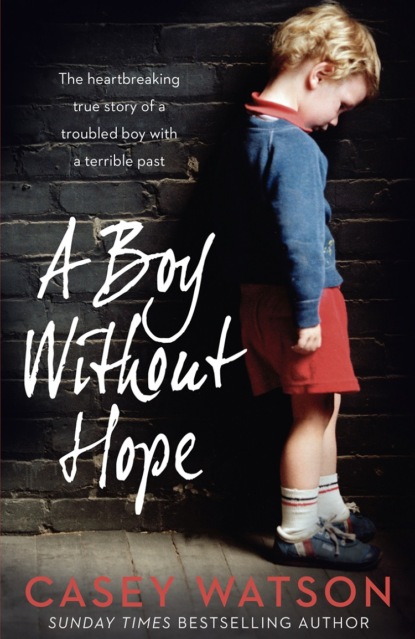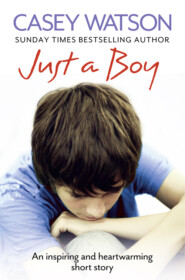По всем вопросам обращайтесь на: info@litportal.ru
(©) 2003-2024.
✖
A Boy Without Hope
Настройки чтения
Размер шрифта
Высота строк
Поля
But why the three-hour gap anyway? Would it really take that long to work? Was he simply taking it too early in the evening? I’d looked after a child who’d been prescribed melatonin a few years back, Olivia, and though she’d been younger I had a hunch that the principle held true; she’d take the pill at bedtime and, for the most part, would be asleep fifteen minutes later. Should I hold off giving Miller his three till it was time to go to sleep? Perhaps having it too early made it easier for his body to resist it – something I would need to discuss further with my GP.
For now, though, I decided, it was time to stop the rot. Yes, he was a serial absconder, but I’d managed my fair share of those, and even if taking him out meant risking him doing so, there was no way he could remain shut up in a house indefinitely. I needed to get him out, not least because it wasn’t rocket science that, everything else notwithstanding, some physical exercise would obviously aid sleep. He might manage to escape from me – from what I already knew, it was odds-on he would try – but I was reassured by what also I’d read and heard about him always coming back again and, in the absence of anyone else stepping in to either sit with him or accompany me, I was going out and he was coming with me, end of.
To that end, I’d already told him it was too late for breakfast, and that, today, we were going to sit down and have lunch together before him getting bathed and dressed, and going into town.
I’d made pasta, which he apparently liked, and set the kitchen table. ‘It’s almost ready, Miller!’ I called up the stairs. ‘Come on down, love.’
As I was beginning to realise was his instinctive way, he immediately responded to the request. Not with ‘I’m coming’, however, but with his own counter-order. Just as he’d done with the games console the first night we’d had him, he seemed incapable of responding to any request for action without adding several minutes before he did it. In this case, apparently, he required three.
This, in itself, wasn’t that unusual. Kids who are insecure because of abuse or neglect – and often both – will often attempt to exert control on their surroundings via time, needing to know what’s happening, when it’s happening, and needing constant reassurance that it actually will happen. This seemed different, though. It was almost as if he had a built-in resistance to doing anything without imposing his own timeframe on it. I suspected that if I told him there was a giant Easter egg downstairs waiting for him, he’d practise the same curious delaying tactic before he took it. It seemed almost knee-jerk, and I wondered if this was what Libby meant when she’d commented that he needed control. It didn’t matter what was asked of him – clean your teeth, go to bed, brush your hair, or whatever. He would only do it after a further few minutes had passed, the number of which he decided.
I’d tried to be wily, saying things like ‘breakfast will be ready in three minutes’, but, faced with that, it was almost as if he turned into an android, for whom it simply ‘did not compute’. He’d either shrug or mumble, or not respond at all. Then duly appear, not in three minutes, but in five.
I wasn’t stupid. I knew I had two choices in how to deal with it. I either accepted this oddity, and planned things accordingly, or tried to address it by tackling it head on, which would, of course, lead to endless confrontations, at least in the short term. But this was no easy choice till I knew what I was dealing with. If he genuinely had some kind of timekeeping phobia, then it would do him no good if I bulldozed straight in and created even more disorder in his already insecure world. If, however, it was simply a long-ingrained control thing, honed over years of manipulating various carers, then the sooner I tackled it the better. Quite apart from my own desire to escape the proverbial four walls, I knew, both as a mum and an employee – as a foster carer – that I wouldn’t be living up to my responsibilities if I simply allowed him to fester in his room, surfing the web. But without the bigger picture – all those long years of records I could pore over – I didn’t yet feel able to make the call. I simply didn’t know him well enough.
Today, though, other concerns over his welfare took precedence. We were down to the last of the melatonin Libby had brought for him, so, one way or another, a visit to the doctor had to happen – as well as the necessary phone call to discuss it, so I could pick up a prescription. And with Mike at work, and my reluctance to rope in poor Tyler, that was happening this afternoon, come what may.
Miller shuffled into the kitchen just as I was dishing up two bowls of pasta. ‘So, after lunch, love,’ I told him as I set them on the table, ‘I’d like you to get dressed, as I said earlier, because the two of us are going out. Remember?’
He slid into his seat and picked his fork up, his gaze flickering intermittently towards me. Though it was almost impossible to catch his eye for any length of time and I wondered if there had been discussions about autism in his records. Struggling to make eye contact was common for kids on the spectrum.
‘Going where?’ he asked. ‘It might be somewhere I don’t want to go.’
‘To pick up a prescription for your pills,’ I said. ‘And then …’ I shrugged. ‘Who knows? It’s a beautiful day. Perhaps the park?’
‘But I feel sick,’ he said immediately. The response seemed automatic. And this despite the speed with which he was shovelling pasta into his mouth. ‘So I can’t go out. It’ll make me feel sicker.’
I sat and watched him eat, waiting for him to recognise the absurdity of what he was saying. But he didn’t – or didn’t appear to. He just polished the lot off. All but licked the bowl out, in fact. ‘What?’ he said, as he raised his head finally and caught me smiling at him.
‘Enjoy that?’ I asked him mildly, nodding my head towards the empty bowl, and inviting him to get the point I was making.
But bright though he obviously was, he didn’t. But perhaps that was intentional. I stood up and reached across for his bowl. ‘Half an hour.’ I told him. ‘Then it’s bath, dress and out, okay?’
He pushed his chair back, rolled his eyes at me and headed back upstairs. I didn’t push it, but I did need to decide how to play it. Stern adult mode? Pleading mode? Negotiation-for-a-reward mode? I had a selection of ways to approach the problem. I just had to decide which one to try.
Because of his many problems – both behavioural and medical – Miller was under a consultant who specialised in sleep disorders, which meant that though I knew my GP would be happy to take him as a patient, he would be unable to prescribe his current medication without the surgery first contacting the doctor in question and him confirming that it was okay to do so. In the longer term I’d doubtless be taking Miller in to see him, but, for the moment, it was more a case of all the boxes being ticked so that I could have a new supply of the apparently precious pills – even though they seemed to be doing precisely nothing.
I’d just finished speaking to the surgery, who’d confirmed the fax had come through okay, when my mobile trilled again. It was Libby Moran.
Finally.
‘So, how’s the little monkey been, then?’ she chirruped, putting the lie to what I’d seen with my own eyes when they’d arrived: that she didn’t see him as a little monkey at all.
There was no point in being anything other than frank. ‘Well, to be perfectly honest, I’m struggling to work out how best to look after him,’ I told her. ‘I know so little about him, and nothing else seems to be forthcoming, either. It’s like I’m trying to feel my way in the dark. Plus, right now, I can’t even get out of the house.’
‘I know, I know,’ Libby replied in what I imagined was meant to be a soothing tone. ‘That’s precisely why I’m phoning you. To check how things are going, but also to tell you that I’m about to send you an email with some attachments. It’s mostly bits and bobs of things I’ve managed to get hold of, but I wanted to highlight a couple of things before they land in your inbox, because I feel they need a bit of clarification.’
This was an oddity. Wouldn’t the record for Miller speak for itself? Why would his official history need clarification? If it did – and she clearly thought so – why not just amend the record before sending? That said, I could probably answer my own question. Because experience had long taught me that ‘facts’, taken out of context, could be misread. Perhaps that was the case here; perhaps she’d done some digging and decided time was of the essence. Better to put me in the picture first, and amend the record later.
‘What sorts of things?’ I asked her.
‘Just a couple of things I wanted to flag up, really,’ she said. She was obviously in her office. I could hear paper being moved around, the clack and clatter of people typing. Other people. What I wouldn’t give for spending time with some right now. ‘Firstly,’ she went on, ‘the report from a particular foster carer, a Mrs Lyndsay Taylor. She tells of an incident – a really horrible incident actually – where Miller has killed a pet rabbit with a rake …’
Oh, great. ‘Libby,’ I interrupted. ‘How old was he when he did this?’
‘He was nine,’ she said. ‘But the thing is, the report just states exactly that, that the poor boy killed a family pet, and how he did it, but after double checking this morning, I found that the full story wasn’t there. I tracked Mrs Taylor down and she admitted that Miller had already been bitten twice by the rabbit. And on that particular day, he’d unlatched the cage and it had leapt out, scaring him half to death. He’d snatched the rake up in fear – she’s sure on this point – and started to swing it. And unfortunately, he hit the rabbit, and one of the spikey things went into it. And the injury was so severe that they had to put it down.’
Well, that makes it all so much better then, I thought. Not. But I also knew how instinctive it could be for damaged kids to lash out first and think later. It was often all they knew. It was exactly how it had been with Tyler, for that matter – pushed to the brink and grabbing the first thing to hand. So it was important not to judge without first establishing context. And a good sign that she’d taken the trouble to find out a little more about it. She was obviously conscientious and that could only be a good thing. ‘Right, I’ll bear that in mind when I read your email,’ I said. ‘And the other thing?’
‘Just about his past, and how he came into care. There’s a lot to read on that, and I really recommend that you do. It’s a shocking read – worse than I expected, to be honest – but it’s also really illuminating.’
‘Thanks,’ I said. ‘I’ll look forward to getting my teeth into that.’ Which then struck me as not quite the best way to put it, given what she’d just told me about the rake. ‘What about school?’ I hurried on. ‘Any news there? I just think the sooner we get him back into education the better. The rate we’re going, I wouldn’t be surprised to go upstairs and find him gone – sucked into one of his flipping computer games.’
She laughed. ‘I hear what you’re saying. But, tentatively, that’s a yes. ELAC have apparently found a provision, and you should be getting a call later to let you know what’s been arranged. So that’s good news, isn’t it?’ she finished brightly. She sounded pleased with herself. And she’d a right to. Though I was still feeling a bit unsupported with my ‘little monkey’, at least we had some progress at last.
I thanked her, and clocking the time – it was fast becoming a habit – headed to the foot of the stairs to do battle. And in the real world as opposed to the virtual. But no sooner had I opened my mouth to give him his three-minute warning, than I heard, ‘Shit, shit, shit, SHIT!’ from upstairs.
‘Miller!’ I called up. ‘Please don’t use that language in this house. And you have three minutes left to play your game, so finish up, okay?’
I waited for a reply but all I could hear was the din from the PlayStation. I tried again, ‘Miller! Answer me, please!’
‘God!’ came the reply. ‘What is it now? I’m busy!’
I took a deep breath. Start as you mean to go on, Casey. I pushed my sleeves up, and thundered up the steps to his room and, since the door was wide open, I went in.
He was cross-legged on the floor, in front of the TV screen, with his back to me. ‘Miller, I told you. We have to go out. We are going out. Now put down the controller and get yourself dressed. Otherwise, I’ll have to switch off the internet.’
There was a heartbeat of silence and stillness. Clearly, though he affected not to, he was listening to me. And, as a consequence, to my surprise, he didn’t bother giving me more lip. Simply threw down the controller, scrabbled to his feet and launched himself at his unmade bed, where he burrowed under the duvet and rolled himself up, Swiss-roll style. Completely, from head to foot. He then started to howl – not like a child would, but like a wolf. ‘Ahhhoooooo! Ahhhoooooooooo!’
It was, as Tyler might put it, interesting. Quite unlike anything I’d heard before. I’d heard all kinds of noises coming out of kids’ mouths over the years, but this one definitely had an unusual repertoire. And, since he showed no sign of stopping – perhaps he was waiting for a reaction? – I crossed the room and placed a hand on the squirming mound. ‘Stop being silly, love,’ I told him. ‘Just come out from under there and get dressed, please. It’s such a lovely day out there, and you need some fresh air.’
He twisted away from me, with another howl. This time one of pure anguish. ‘Nope!’ he shouted. ‘Nope, nope, nope, NOPE!’
He sounded more like a toddler having a tantrum than a twelve-year-old, but while a part of me still felt an almost overwhelming urge to grab one side of the duvet and simply unroll him, I reminded myself that this wasn’t a normal twelve-year-old. This was a kid with a whole lorry load of deep-seated problems, most of which I hadn’t the first clue about beyond the various prophesies of doom that came with them. And who now appeared to be having a major meltdown. Cursing myself for agreeing to take him without first demanding the tools to enable me to understand him, let alone help him, I took another deep breath and quietly walked out of the room – time out for both of us, while I read Libby’s email.
I was halfway down the stairs when I heard the sound of laughter. Then his voice, light and calm, came floating down the stairs.
‘Miller, one,’ he called out. ‘Hah! Casey, nil.’
Ah, I thought. So that was how it was going to be.
Chapter 7 (#u6dcccb14-42e2-5a8b-93a4-a0734658d271)
Difficult to like. Those had been John’s words, and as I headed back downstairs again they nagged at me. I’d fostered many a child who had fitted that description – it sometimes felt as if it went with the territory. Kids who’d been in care for a long time often fell into that category, simply because they so often displayed long-entrenched behaviours that would challenge the patience of a saint. This was almost always because they had profound psychological problems, and sometimes, in addition, because they’d created a mental ‘loop’ – bad behaviour got them attention, so it was self-reinforcing, and, in addition, because that attention was negative in nature, it then confirmed their highly negative sense of self. This led to more self-loathing, and, even if it was subconscious, it almost invariably led more bad behaviour.
Breaking the cycle, therefore, was, in part, about re-programming a child’s ability to control themselves – getting them to realise, through the use of a strict regime of consequences and rewards, that they had choices in how they handled a situation, earning points for good behaviours (obviously geared to their age and relative maturity) and losing privileges when they fell short of what had previously been agreed.
It was the cornerstone of the programme Mike and I had been trained to deliver, and once negotiated and agreed upon, usually as soon as practical at the start of a new placement, it was simply a question of sticking to it, and rigidly. I’ve said it a million times but it wasn’t exactly rocket science. Basically, you did your homework, so you had an idea of what a child liked to do. Then, based on that, you’d decide what rewards were suitable reinforcements to offer in exchange for good behaviour and completed tasks.











